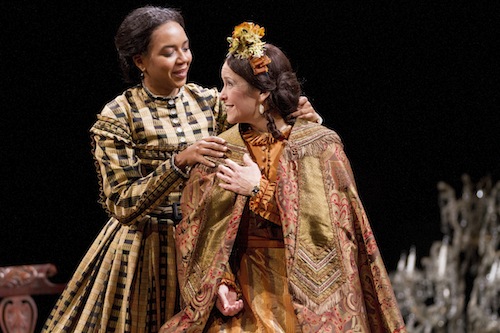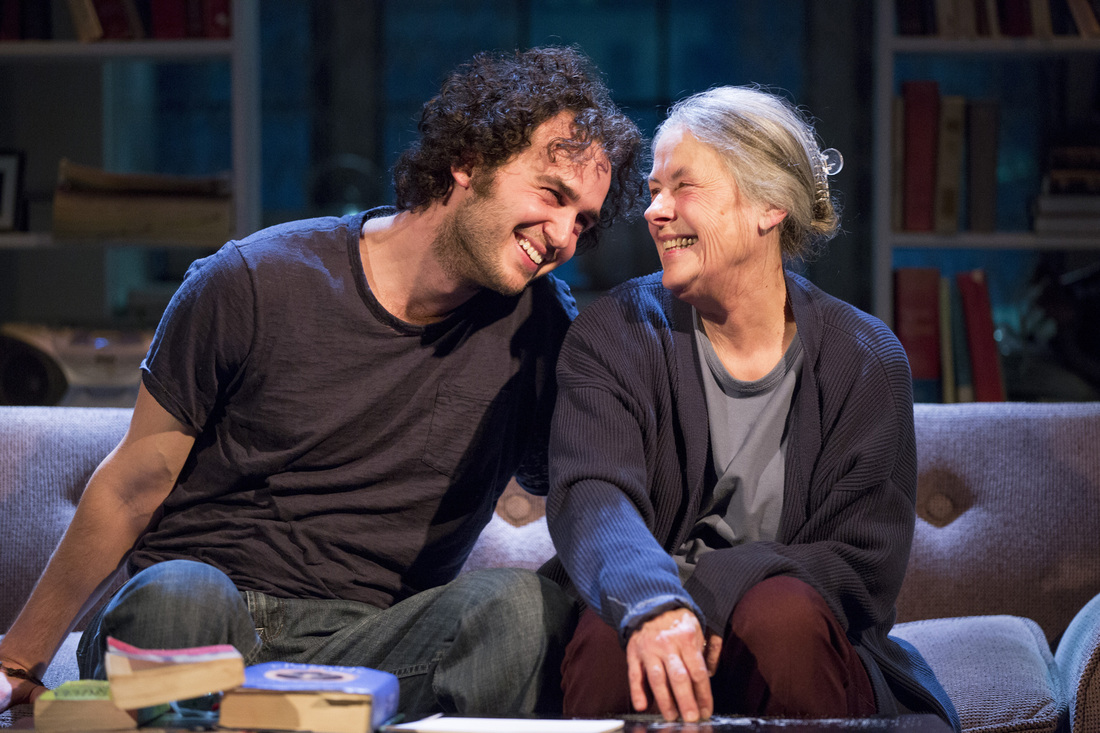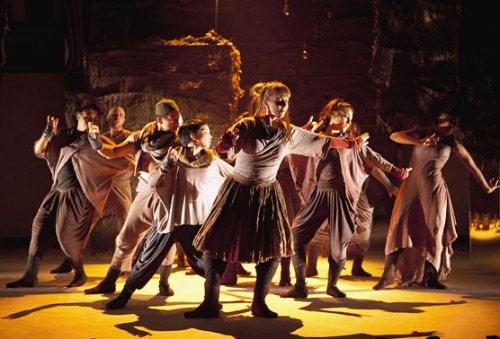|
JACQUELINE E. LAWTON: Why did you decide to get into theatre? Was there someone or a particular show that inspired you?
JENN LARSEN: When I was very young I saw Derek Jacobi's Hamlet on public television and was completely transfixed by his vocal command and ability to make the text absolutely clear. Watching that incredible performance made me fall in love with Shakespeare. Soon I was reading all his plays, and getting mercilessly teased for it in school. Still, I didn't consider theater as a profession until just before choosing universities. There must've been some subconscious desire at work. When I went on tour with National Players after college, we did workshops for underserved communities. One teacher told me, "Good luck, my students don't get Shakespeare. They just aren't smart enough." It was an unbelievable moment. I was determined to prove her wrong. The best monologue that day turned out to be delivered by the boy she thought was the worst troublemaker. He got it. Everyone can fall in love with language, with theater, with Shakespeare. That moment clinched it for me. JL: How long have you lived and worked as a theatre critic in D.C.? What brought you here? Why have you stayed? JL: I originally came to DC to get my undergraduate degree in Drama at the Catholic University of America some twenty years ago. I was lucky to have amazing and dedicated professors who fueled my love of the stage: Bill Graham for acting, Chris Wheatley for Shakespeare, directors Jim Petosa and Bill Foeller, designers Gail Stewart Beach and Tom Donahue. Early on I realized DC's theater community had a strong history and truly vibrant local talent. The city seduced me slowly by being livable and lovely. It was relatively easy at that time to do your own thing and start a small theater company. Space was certainly cheaper. I'd had grand ideas of leaving eventually, but after falling in with like-minded friends and creating our own world, I stayed, working as an actor and a costume designer. Eventually I took a break from both, but by then I was entrenched in DC. When I began writing online in 2005, I decided to start reviewing theater, informally but slowly gaining my voice. When I helped found We Love DC in 2008, taking on the arts and culture editor role, theater criticism became a serious commitment. In hindsight it was a natural progression. My training at CUA was strongly based in theater history and textual analysis. Artist, critic, and audience are all engaged in a powerful dialogue about what theater means, and it's exciting to be part of that. JEL: How do you define the work you do? Specifically, what is the role of the theatre critic in the world of theatre? What contribution do you hope to make in the D.C. Theatre community and the American Theatre? JL: Theater criticism becomes historical record. The role of the critic is to capture, document, and contextualize production. Performance is beautifully ephemeral. Words about performance last. Beyond the aspiration, though, is the practical! You can't escape the fact that people read reviews to decide whether or not to spend their time and money on seeing a production. Honoring both is the contribution I strive to make. JEL: If your work as a theatre critic doesn’t pay the bills, what else do you do? How do you balance this work with your play viewing and criticism? JL: I've been struggling with illness the past year, so that's the main issue I currently balance against writing. But the days when I was so intensely worn out and depressed, theater was the bright star that kept me going. That was true before, when I was working as an office manager to pay the bills. But we're all multitasking now. No one way will work for everyone. I used to write early in the morning, before that, late at night. The challenge is learning how to split focus without degrading value. JEL: What skills and traits do you feel a successful theatre critic should have when writing about theatre, especially when it comes to new plays? JL: Thoughtfulness, empathy, and observation are the key traits I value. You're taking in a fast flood of words, ideas, and clues when viewing the production. Be open first, formulate after. Probably the most difficult skill to learn is how to separate your personal preferences in order to critique a production on its own terms. I don't think of new plays any differently than old plays. All plays were new once. If it's in performance, and people are paying to see it, then it's deemed ready for criticism. That being said, if a new play is overtly political, I tend to judge it on relevance and whether it might be performed 10, 20 years down the line. JEL: What is your writing and viewing process? Do you read the script prior to seeing a production? Do you research the author and/or world of the play? Do you read the program notes? JL: I try to approach the production completely fresh, so I don't read the script before first viewing. However, often you already know the play, which can then be tricky as you have to really release your preconceptions. Sometimes I take notes during a performance, but I try to minimize that as it tends to take you out of the flow of the piece. I'll write up initial notes during intermission and immediately afterwards. Then I'll do research on the play, the author, the world, etc. I always read the program notes, and am keenly interested in what the dramaturg has to say, because that research informed the director and the cast. Then, I like to let my thoughts sift and settle down before full-on writing. So if you see me out right after a show, writing intensely in the corner of a bar, you know the play catapulted me over my usual method! JL: In the article, “Ohio Critic's Tough Words Elicit Rough Reaction,” Denver Post Theater Critic John Moore states: “There is no universal rule book for criticism, no how-to manual. My guidelines: Be true to your visceral emotional response, good or bad. State your case and back it up. Be a catalyst for discussion. Encourage dialogue. Don't be personal. Never try to be funny at the expense of someone's feelings.” What guidelines, rules or standards do you have for your own work? Have you always upheld them? If so, at what cost? If not, what shifted the line for you? JL: In university, I was profoundly influenced by reading historical negative reviews of actors whose work I admired. My senior thesis was on Michael Redgrave, who was savaged by critics, and I remember having to read dozens of reviews that were simply mean-spirited. Kenneth Tynan's famously caustic reviews of Vivien Leigh were another influence. That was an era when the critic was competing with the performer to be brilliant at the expense of civility, and reading them can take your breath away. Never be cruel. There is simply no reason. The moments when I allow negative emotion to take over positive reason in critiquing, I always regret. You can't deny your initial visceral response, but you have to learn to back it up and defend your opinion. It's the best guideline, and the hardest lesson. The greatest part is to constantly be reminded that theater is still vibrant and alive, despite being pronounced dead so many times, and to have the ability to champion talent that deserves recognition. And well, let's be honest, having the chance to influence the dialogue about theater's future. Consistently seeing theater, actively processing your thoughts on it, and debating its value with others, is exciting and a real joy. The most difficult challenge is having a theater background and knowing how much hard work goes into a production. When it just doesn't succeed, that knowledge makes it agony to review. That also makes it difficult when a theater professional takes issue not with what you wrote about them, but what you didn't write. That seems more about individual recognition than about group achievement, but you also understand they want to be noticed for the work. Learning how to refine and streamline a review is a constant challenge. You want to effectively edit so that a reader gets all the pertinent information to make a decision about whether to see a production, but you also want to provide them with context, a sense of the atmosphere, and some history. Ultimately it's a review, not a thesis! JEL: Who are your favorite playwrights? What is it about their work that inspires or draws you to them? JL: My favorite playwrights are those who play with audacity. Anyone daring enough to go over the top with rich, poetic language mixing modernity and myth. Shakespeare remains the gold standard for me, and I have a special love for Howard Barker. That kind of epic theater always thrills me because when done well it illustrates the essential power of live performance. Enda Walsh is one of the few playwrights who can make me cry just by his turn of phrase. Annie Baker, who's brave enough to play with silence and intense realism. Luis Alfaro, genius. Playwrights can sometimes be overlooked in criticism, but I always try to go back to the text. The script is the backbone. JEL: DC artistic directors are … JL: Brave. I really admire their resilience in the face of criticism. The success of an entire company of artists and administrators rides on their choices, and the pressure is intense. JEL: DC actors, designers and directors are … JL: Dedicated. We're lucky to have so many talented artists make DC their home base. There's enormous pressure to leave, and yet, they resist. I'm proud of that, and of the immense talent here. JEL: DC playwrights are … JL: Elusive. That's a joke. I just wish I knew more of them. Time to invite a crew to coffee and investigate the questions, "Why are you here? What stories excite you?" JEL: DC audiences are ... JL: Not to be underestimated. This is an extremely intelligent, diverse, and multinational crowd. JEL: How do you feel the DC theatre community has addressed the issues of race and gender parity? How has this particular issue impacted you and your work? JL: The theater community is aware of the need for race and gender parity, and tries out different approaches to encourage it. There's an issue with socio-economic parity as well. Maybe it's because I see theater on press nights, but audiences seem to be, for the most part, older and moneyed. Despite everyone's best intentions, I think most people agree we still have a way to go. I've been attacked with misogynist language at all stages of my theatrical life. It's happened in the so-called corporate world as well. It's improving, or maybe, it just might be more subtle. I hope it's the former. JEL: What advice do you have for an up and coming DC based theatre critic who has just moved to the area? JL: Know your theater history. I can ask anyone their opinion, but a critic should contextualize it for me, and tell me something I may not know. Learn about the history of DC theater itself. Respect the process artists go through to produce the work. Talk to them about their aspirations, and understand what motivates them. Be trustworthy. Keep your integrity. Don't worry about being clever. Be truthful. Most importantly, it's going to be hard to resist becoming jaded. Try not to lose your sense of wonder every time the curtain comes up. Let it astonish you.
0 Comments
Your comment will be posted after it is approved.
Leave a Reply. |
My BlogI'm a playwright, dramaturg, and teaching artist. It is here where you'll find my queries and musings on life, theater and the world. My posts advocate for diversity, inclusion, and equity in the American Theatre and updates on my own work. Please enjoy!
Categories
All
Archives
June 2020
Reading List
|



